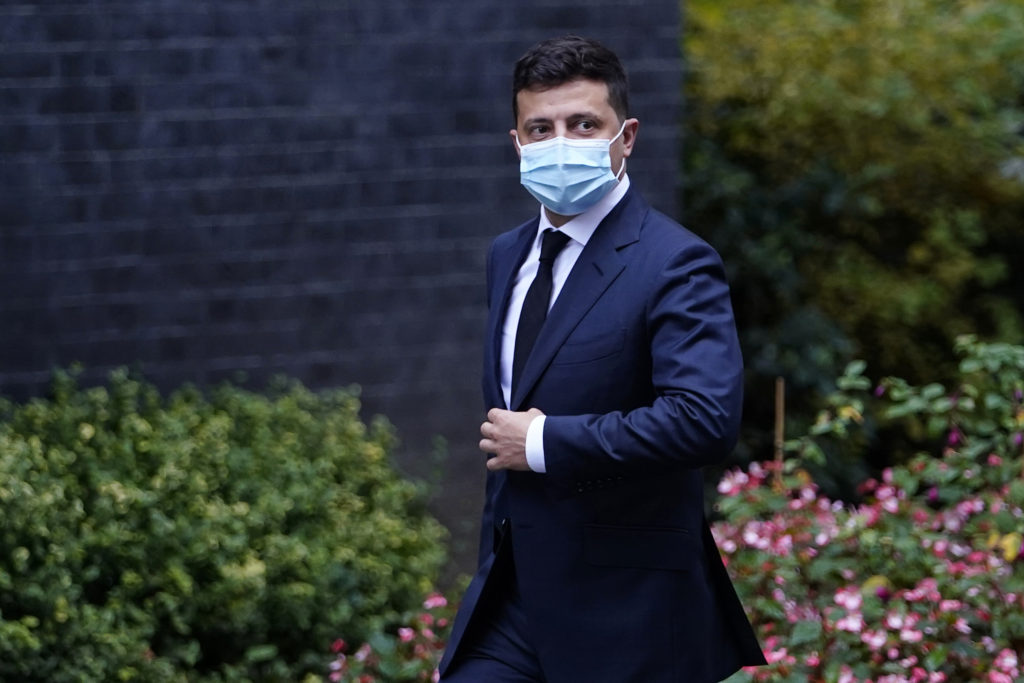U.S. President Joe Biden slapped comprehensive sanctions on Russia in response to what Washington said were cyber attacks, interference in U.S. elections and Moscow’s behaviour towards Ukraine amid the Kremlin’s military buildup on the border seven years after it annexed Crimea.
Ukraine immediately welcomed the punitive measures, widely anticipated but still a stark contrast with Donald Trump’s less aggressive actions while in office.
Authorities in Kyiv proceeded with an offensive to secure diplomatic – and military – support in the light of the deployment of some 80,000 Russian troops in Crimea and to areas near Ukraine’s eastern Donbass region held for seven years by separatists aligned with Russia.
A drive to win NATO membership, however long-range that campaign might be, has been the main focus of the diplomacy, including talks in Brussels with NATO Secretary General Jens Stoltenberg and U.S. Secretary of State Antony Blinken. But both officials and rank-and-file Ukrainians seemed to be discounting the notion of a full-scale Russian invasion, which raised alarm bells only a few days ago.
Ukrainian President Volodymyr Zelensky was due to meet French leader Emmanuel Macron in Paris on Friday – with German Chancellor Angela Merkel expected to join them in a video link. The meeting would replicate the four-sided “Normandy format” diplomatic format, set up to deal with the protracted occupation of 7 percent of Ukraine’s territory in the eastern regions – minus Russia.
Biden’s sanctions included the expulsion of 10 Russian diplomats alleged to be involved in spying and a bar on U.S. financial institutions buying rouble-denominated Russian sovereign bonds from June 14. In concert with the European Union, Britain, Australia and Canada, the Treasury also sanctioned eight individuals associated with Russia’s occupation and repression in Crimea.
Russia summoned the U.S. ambassador and said Washington would be responsible for any souring in ties. Biden urged Russian President Vladimir Putin this week to reduce tensions on the Ukrainian border and proposed holding a summit in a third country.
Ukraine seeking help from Western partners
“Ukraine welcomes the new set of U.S. sanctions on Russia to hold the Kremlin accountable for the ongoing occupation & gross human rights violations in Crimea,” Ukrainian Foreign Minister Dmytro Kuleba said in a tweet.
Kuleba, speaking later on a television talk show, said that if Russia went ahead with a mass cross-border incursion, Ukraine was sure to get help from its Western partners.
“If, God forbid, large-scale military action is resumes, we will secure concrete, significant military-technical assistance from many of our partners that would significantly strengthen Ukraine’s defence capabilities and help us throw back the aggressor’s attack,” he said.
Kuleba said there were “no taboo subjects” on the kind of help Ukraine could expect.
“In Brussels, for instance, I clearly listed what we expect as quickly as possible, what are seen as very urgent needs,” he said.
Ukraine, he said, was ready to hold “a full-fledged four-sided summit in the Normandy format and speak directly to Putin. Unfortunately, Russia is avoiding this format.”
Donbass “under control”, says Zelensky
Zelensky, in comments published on his web page, said the situation in Donbass had been a key issue on the agenda of a meeting of the National Security and Defence Council. But he offered few details.
“The situation in Donbass is under control,” Zelensky wrote. “If there are questions, we are ready to answer them The army is ready.”
Ukrainian officials say they expect more troops to be deployed over the next week or so. Russia says troop movements are its own business, pose no threat and have been undertaken in response to what the Kremlin says is aggressive behaviour by the United States and NATO.
Commentators in both Russia and Ukraine have suggested that deployment is aimed more at impressing the West than embarking on a mass intrusion into Ukraine.
“Russia has concentrated more than 80,000 troops near Ukrainian territory – and that has not occurred since 2014,” the website nv.ua said in a commentary. “That is not a large number for a big war. But it is sufficient to stage large-scale provocations that would involve crossing the Ukrainian border.”
Ukraine’s navy reported one such provocation on Thursday, saying a boat belonging to Russia’s FSB intelligence service had tried to accost and interfere with a group of Ukrainian vessels in the Sea of Azov – next to the Black Sea – but the Ukrainian ships were able to proceed with their journey. Similar incidents had occurred overnight involving Russian coast guard vessels.
But tensions were taken down a notch when Turkey said a U.S, move to send two warships to the Black Sea had been rescinded.
An opinion poll conducted by Gradus Research found 22.8 percent of respondents in Ukraine believed a Russian military invasion was likely, while 15.3 percent ruled out any such action. A total of 14.9 percent percent viewed an invasion as “very unlikely” and 22 percent as “probably unlikely”. A further 16 percent gave no answer.
And 52.7 percent of respondents said Russia had massed troops to the border to intimidate Ukraine and proceed with plans favourable to the Kremlin.

